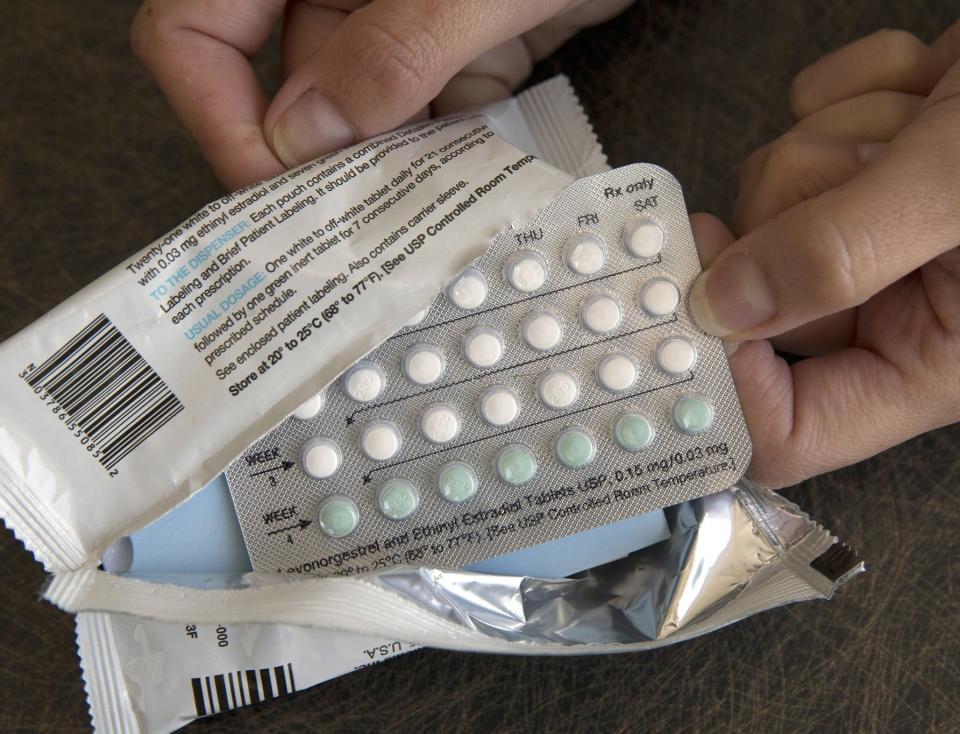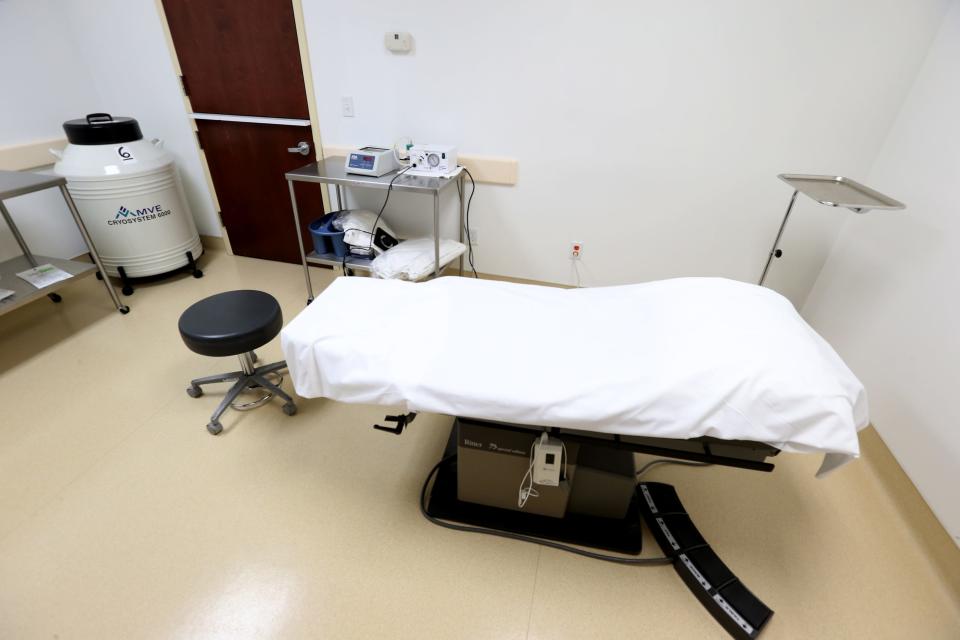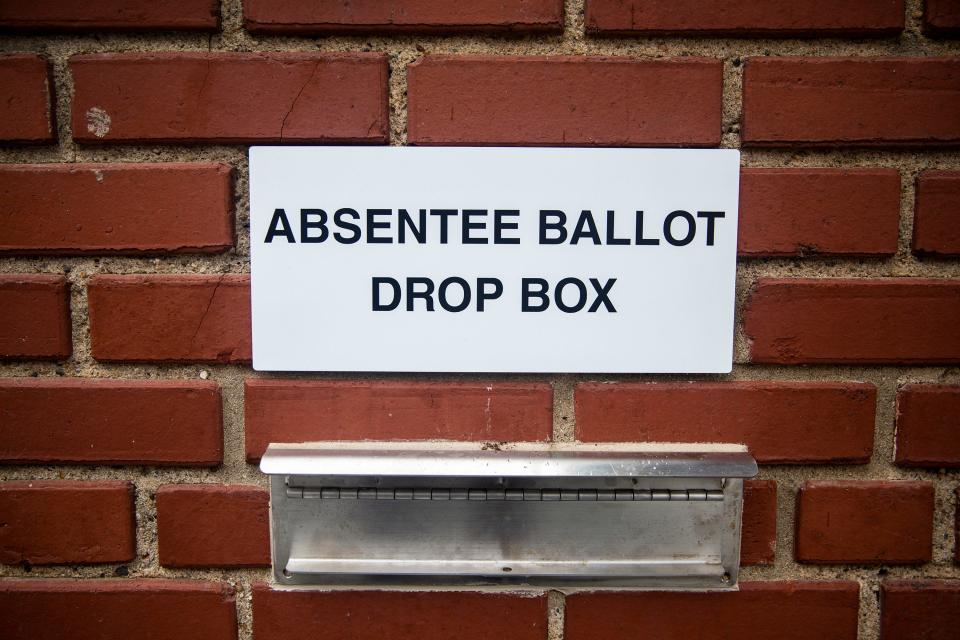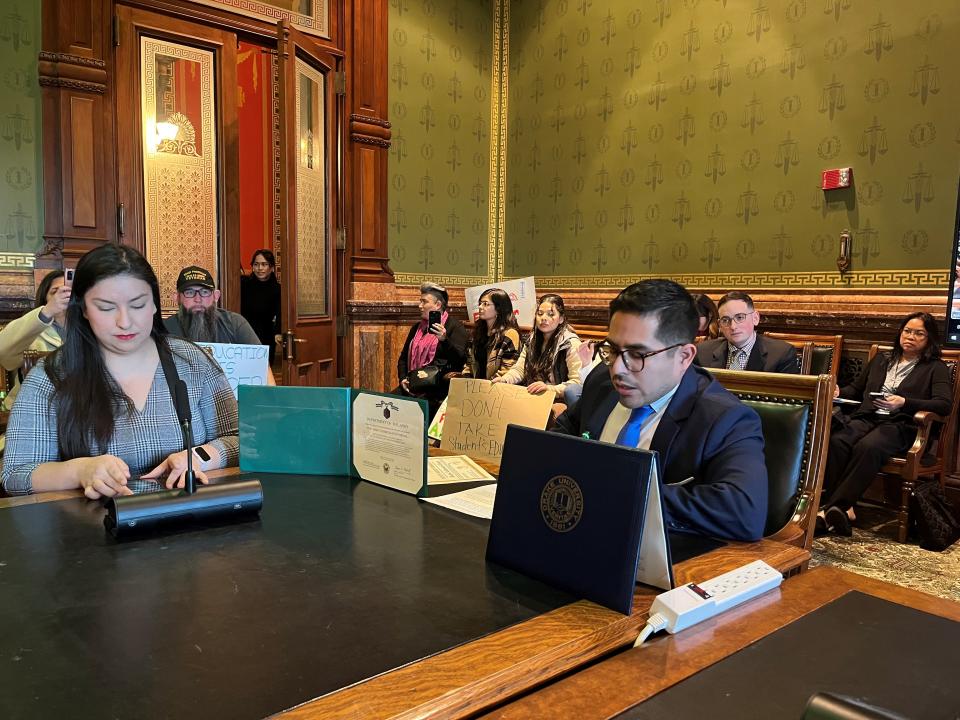Republicans kill bevy of bills in Iowa Legislature's 2nd 'funnel.' What lives, what died:
Iowa lawmakers have shelved high-profile bills on fetal homicide, immigration, gender identity, birth control, the state auditor’s office, diversity, equity and inclusion programs and social studies education.
The Iowa Legislature’s second “funnel” deadline on Friday saw a flurry of Republican-backed bills fail to advance, including some priorities of Gov. Kim Reynolds, such as defining “man” and “woman” in state law and expanding birth control access.
To survive the funnel, bills generally have to pass a full chamber and through a committee in the opposite chamber.
There are exceptions. Tax and spending-related bills are exempt from the funnel. And legislative leaders can designate a bill as “unfinished business,” allowing them to continue to consider the policy.
That’s what happened to two of the highest profile bills this year: House and Senate Republicans’ plans to overhaul how Iowa’s Area Education Agencies provide special education and other services to school districts.
Each chamber has rewritten Reynolds’ original proposal, but they’ve so far failed to find agreement.
More: As Reynolds pushes big changes to Iowa special education, most like AEAs, Iowa Poll finds
Senate Majority Leader Jack Whitver, R-Grimes, said he’s hopeful lawmakers will pass some changes to the AEAs this year, although he noted that the House and Senate plans differ from each other and from the governor’s bill.
“We’ve got to get our own bill off the floor hopefully soon to really start that conversation to see where it ends,” he said. “But we’ve had good conversations with both the House and the governor so I’m optimistic.”
House Speaker Pat Grassley, R-New Hartford, agreed Republicans are having productive conversations on AEAs and on increasing starting teacher pay and setting next year’s school funding level.
“It looks like there’s a willingness to want to increase beginning teacher pay. It looks like there’s a willingness to want to have some level of reform when it comes to AEAs. … It’s just obviously what are the details and the final products going to look like?” he said.
Democrats oppose wholesale changes to the AEAs. They say the issue has distracted Republicans from more pressing issues, like setting education funding levels for the upcoming school year.
“The AEA bill is playing into why everything has slowed down and there’s been no action on school funding and other school issues,” said Senate Minority Leader Pam Jochum, D-Dubuque.

House lawmakers have been far more active than their Senate counterparts this session. The House has passed 150 bills this year, while the Senate has passed 51.
With so many bills falling by the wayside, House Minority Leader Jennifer Konfrst, D-Windsor Heights, said Republicans have failed to govern effectively.
“They have both chambers’ majorities and they have the governor’s office, so why are they unable to agree on so many pieces of legislation?” she said. “Great question. I think it’s because they’re not communicating, and they’re in disarray. They have different priorities.”
Whitver said the bills he believes are the most important for the state are still alive for consideration.
“I think Iowa’s in a really good spot, and we don’t need that many bills, in my opinion, to make Iowa strong and to keep Iowa strong,” he said.
Here’s a look at where major pieces of Iowa legislation stand after the second funnel.
Jump to what matters to you:
Education | Health Care | State Government | Business | Law enforcement and courts | Immigration
EDUCATION
Bills still alive
Area Education Agency overhaul
House and Senate Republicans have each proposed their own rewrite of Reynolds’ controversial bill to overhaul the state’s Area Education Agencies and change the way students receive special education services. Both bills would establish a Division of Special Education within the Iowa Department of Education to oversee services.
House File 2612 would leave the AEAs as the sole provider of K-12 special education services, while allowing school districts to contract with other providers for media services in 2025 and general education services in 2026. The plan would continue sending federal special education money directly to the AEAs, while state aid and property tax dollars that currently go to AEAs would be sent to school districts.
Senate File 2386 would send 90% of funding dedicated to special education to individual school districts, while 10% would remain with the AEAs. Districts would receive 60% of the money AEAs currently receive for media and general education services, while AEAs would get the other 40%. School districts would not have to continue using AEAs for special education services, media services or general education services and could decide to contract with another provider. The bill also includes a pay increase for teachers.

Arming school staff and requiring school resource officers
Teachers and other school staff could carry guns on school grounds if they obtain a professional permit and complete training, under this bill that passed the Iowa House.
School districts with 8,000 or more students would be required to have at least one security officer or school resource officer in schools where ninth through 12th-grade students regularly attend classes, unless that district’s school board votes against it.
Private schools and public schools with fewer than 8,000 students would be encouraged to contract with or employ a security guard or school resource officer. House File 2586.
Reviewing education standards and core curriculum
This House bill would commission a full review of Iowa’s K-12 curriculum, graduation requirements and academic standards. The Department of Education would issue policy recommendations, including a statewide literacy plan and opportunities for civics learning. House File 2545.
School security and grants for armed staff
Schools that choose to arm staff members could receive grant money to help pay for training and other costs associated with arming staff — including paying for guns — under this bill that passed the House.
The bill would also require schools to complete safety reviews, create a task force to make recommendations for new building code standards for school safety and create a pilot grant program for schools that want to integrate gun detection software with their security cameras. House File 2652.

Teaching literacy
Parents whose students are not proficient in reading at the end of third grade would be given the option to have their student repeat the grade under a bill proposed by Reynolds. The measure would also require teachers to be trained in “evidence-based instruction” on the science of reading and would provide personalized lesson plans to students in third through sixth grade who are not proficient in reading.
A separate Senate bill would implement a reading curriculum more focused on phonics, or sounding out letters as a way to teach reading. House File 2618/Senate File 2195.
Bills that are dead
Eliminating DEI positions at state universities
Iowa’s three public universities would have been required to eliminate all staff positions focused on diversity, equity and inclusion that are not necessary for the schools' accreditation or to comply with state or federal law.
The bill would have codified directives adopted by the Iowa Board of Regents last fall. It would also have required two Iowa lawmakers to serve as nonvoting members of the Board of Regents and capped in-state tuition increases at 3% per year for the three public universities.
It passed through the House but did not receive approval from a Senate committee. House File 2558.
Increasing teacher pay
House lawmakers passed a bill to raise starting teacher pay to $50,000 per year, as Reynolds has proposed. The House bill would have first raised minimum teacher pay to $47,500 for the coming school year, then to $50,000 the next year.
The House proposal also includes $14 million for schools to raise nonsalaried school staff pay to $15 per hour and another $22 million to raise experienced teachers’ salaries. It does not include language in Reynolds’ bill that would provide teachers with at least 12 years of experience with a minimum salary of $62,000. House File 2630.

Revamping social studies curriculum
Social studies curriculum would have been required to include such topics as the "history and meaning of the United States flag and national anthem," the "culture heritage of western civilization, the United States and the state of Iowa," and "the study of and devotion to the United States' exceptional and praiseworthy history."
The bill would have also required “age-appropriate and grade-appropriate” education on the Holocaust for middle and high-schoolers.
It passed the House but did not make it through a committee in the Senate. House File 2544.
HEALTH CARE
Bills still alive
MOMS program changes
The state of Iowa would not have to hire a third-party administrator to oversee the More Options for Maternal Support, or MOMS, program, under a bill that passed the Senate.
Instead, the Department of Health and Human Services could directly oversee the program, which was established to provide state dollars to pregnancy resource centers that counsel women against abortion and offer items like cribs and baby clothes to pregnant women and new moms. House File 2267/Senate File 2252.

Overhauling mental health and substance use services
Reynolds’ bill would reshape mental health and substance use treatment services in Iowa by merging the state’s 13 Mental Health and Disability Service regions and 19 Integrated Provider Networks that manage substance use and problem gambling services into seven behavioral health districts.
The Department of Health and Human Services would take over management of disability services. House File 2509/Senate File 2354.
Postpartum Medicaid coverage
A bill from Reynolds would make low-income mothers eligible for a full year of Medicaid coverage after giving birth, up from 60 days under current law. Coverage would be available only to those whose family income is up to 215% of the federal poverty level ($64,500 annually for a family of four).
That’s down from a maximum family income of 375% of the federal poverty level (about $117,000 for a family of four) under current law. The Senate passed the bill in February. House File 2583/Senate File 2251.
Pregnancy videos in health class
Iowa’s human growth and development classes from grades 7-12 would be required to show students a computer-generated video detailing the stages of pregnancy under this bill that passed the House.
Senate Republicans removed a specific reference to the “Meet Baby Olivia” video developed by an anti-abortion group. House File 2617.
Bills that are dead
Ban on closing places of worship
The governor could not have closed or placed mandates or requirements on any place of worship for any reason, including for a public health emergency, under this House bill. House File 2532.
Birth control expansion
Iowans 18 and older could have gotten birth control, including pills, birth control patches and vaginal rings, from a pharmacist without first seeing a doctor, under a bill from Reynolds that would have expanded access to contraceptives.
The bill, which Reynolds proposed last year without success, would have allowed pharmacists to dispense an initial three-month supply of birth control, and a 12-month supply after that. Patients would have had to see a doctor within 27 months after a pharmacist dispensed the birth control. House File 2584.

Blood donation requests
This bill would have allowed patients to broadly request blood donations from themselves or specific individuals, with blood banks being permitted to deny the request only on the basis of an “imminent risk” to the patient’s life.
It passed the Senate and died in the House after the American Red Cross and medical experts said it could disrupt blood banks and pose risks to patients and families. Senate File 2369.
Death of an ‘unborn person’
Iowans would have faced more prison time for terminating a pregnancy without of the consent of the pregnant person under a bill that passed the House but did not receive a Senate hearing. The bill also changed the language in the law from someone who “terminates a human pregnancy” to someone who “causes the death of an unborn person.”
The bill would have defined “unborn person” as “an individual organism of the species homo sapiens from fertilization to live birth.” It would not have applied to abortions performed with the consent of the pregnant person. House File 2575.
More: IVF fears scuttle Iowa bill raising penalty for ending pregnancy without consent

Nursing home staff training
Iowa nursing home staff would have had to train twice a year with the Department of Inspections, Appeals and Licensing to go over at least three of the 10 most frequent complaints from the preceding calendar year, under a bill that passed the Iowa House but failed to advance in the Senate. House File 2585.
Paid parental leave for state employees
State employees who give birth would have received up to four weeks of paid leave under a bill proposed by Reynolds. A state employee who did not give birth would have gotten one week of paid parental leave.
State employees who adopt would have gotten four weeks of paid leave. House File 2557.
Revoking minors’ ability to consent to HPV vaccine
Iowans under age 18 would have no longer been able to receive a vaccine for HPV or other sexually transmitted diseases and infections without their parent's consent. The bill did not pass in either chamber. Senate File 2064.
‘Right of conscience’ for health care institutions and workers
Health care providers and workers would have been allowed to opt out of services that violate their personal or religious beliefs. The bill would have also protected them from legal action or termination due to their refusal.
It did not come up for floor debate in the Senate. Senate File 2286.
STATE GOVERNMENT
Bills awaiting the governor’s signature
‘Religious freedom restoration act’
The government could not “substantially burden” someone’s exercise of religion except in furtherance of a compelling government interest under a bill that passed the House and Senate.
A person whose exercise of religion has been burdened would have the power to go to court to seek damages or other means of redressing the harm against them. Senate File 2095.
Repealing gender balance for boards and commissions
Iowa would no longer mandate a balance of men and women serving on state and local boards and commissions, under House and Senate bills that would eliminate a decades-old requirement.
The push comes as part of Reynolds’ effort to shrink state government by eliminating more than 100 boards and commissions. Senate File 2096.
Bills still alive
Banning guaranteed income programs like UpLift
Programs that provide guaranteed income payments, like the pilot program UpLift operating in Polk County, would be banned under this bill that passed the House and remains alive in the Senate. Existing programs could remain in effect until 2025.
The attorney general would be granted the power to sue cities or counties to halt any new program. House File 2319.

Boards and commissions consolidation
House and Senate Republicans are taking two different approaches to Reynolds’ goal of reducing the number of boards and commissions in Iowa. The Senate bill matches Reynolds’ proposal, which would cut 111 boards and commissions.
The House has a narrower bill that would cut 49 boards and commissions, largely those that one lawmaker described as “defunct or duplicative.” House File 2574/Senate File 2385.
‘Don’t Tread on Me’ license plates
Iowans could buy custom yellow Gadsden Flag license plates with the slogan “Don’t Tread on Me” under this bill that passed the House. The fees from purchasing the special license plates would be given out as grants to nonprofits to provide training on “the right to keep and bear arms.”
First preference for the grants would go to the Iowa Firearms Coalition, the state-recognized association of the National Rifle Organization. House File 2639.

Limiting ballot challenges, banning drop boxes
Iowans would face an earlier deadline to return mail-in ballots, and ballot drop boxes would be banned under a bill that passed the House.
The measure would also ban ranked choice voting, allow federal candidates convicted of felonies to run for office in Iowa and restrict challenges to presidential candidates’ place on Iowa’s ballot. House File 2610/Senate File 2380.

Bills that are dead
Banning Iowa DNR from buying land at auction
The Iowa Department of Natural Resources would have been forbidden from bidding on land at auction under this bill that passed the Senate but failed to advance in the House.
The DNR would have been allowed to buy or acquire land only from a willing donor or seller. And the department would not have been allowed to acquire property from a nonprofit that purchased the land at auction. Senate File 2324.
Defining ‘man’ and ‘woman’
Reynolds’ bill, which passed the House Education Committee, would have added new definitions of “man,” “woman” and “sex” in state law, as well as required new birth certificates for transgender Iowans that reflect their sex assigned at birth as well as their current identity.
It advanced through committee in the House but never saw floor debate. House File 2389.

Letting state agencies outsource audits
State agencies would have been allowed to hire a certified CPA to perform their annual audit, rather than the state auditor’s office, under a bill that passed the Senate but failed to advance in the House.
Auditor Rob Sand’s office called the proposal a political ploy to undermine Iowa’s only statewide elected Democrat. House Republicans said they had concerns over the cost of hiring outside firms to conduct the audits. Senate File 2311.

Union recertification
Public employers would have been required to provide the state with a list of employees in a public union within 10 days of receiving notice that the union was seeking to hold a recertification election.
If the employer failed to provide the list, the Public Employee Relations Board would have issued a written notification of the failure. If the employer did not provide the list within another five days, PERB would have had to immediately decertify the union. Senate File 2374.
BUSINESS
Bills awaiting the governor’s signature
Foreign farmland ownership
This proposal from Reynolds would grant Iowa's attorney general more power when investigating foreign owners of Iowa farmland. The attorney general would have subpoena power for financial information, purchase agreements and other documents.
The bill would also raise penalties for foreign companies or individuals who fail to register their purchases or holdings and require the secretary of state to compile an annual report of foreign land ownership. Senate File 2204.
Bills still alive
Electric transmission lines 'right of first refusal'
This bill would replace a 2020 law that relates to competitive bidding requirements for electric transmission lines, giving the "right of first refusal" for new projects to companies with existing infrastructure.
The 2020 law is tied up in court, and Republicans see the Iowa Supreme Court’s ruling as overreaching into legislative branch business. House File 2551/Senate File 2372.
Eviction notices for tenants
Holidays and weekends would no longer be included in the three-day notice period a landlord is required to observe before beginning eviction proceedings. Current law requires a notice period of three business days.
The bill would allow landlords to include illegal provisions in their leases, as long as they do not enforce them. Current law bans landlords from knowingly using leases that include illegal provisions. House File 669/Senate Study Bill 3102.
Hemp regulations
Consumable hemp products would be limited to four milligrams of tetrahydrocannabinol (THC) per serving and 10mg per container, under this bill.
It would also ramp up regulations and penalties for violating Iowa’s existing laws and imposes a 21-year-old age minimum to purchase products. House File 2605.

Labeling of lab-grown or plant-based meat alternatives
Lab-grown meat and plant-based meat alternatives could not be labeled as meat without including qualifying phrases like "meatless" or "imitation" on their labels under this bill that passed the Iowa Senate.
The bill would apply only to food processing facilities, not grocery stores. Senate File 2391.
Soil health
Iowa's watershed management authorities would add soil health to their missions under this House bill, which would also make changes to some water quality and flood control programs. House File 2642.

Bills that are dead
Banning bots for online ticket purchases
Creating a bot, or automated software program, to purchase excessive online tickets would have been banned under this Senate bill, which would have allowed the attorney general to sue to block further violations or seek up to $10,000 in penalties. Senate File 2322.
Parental permission for social media
Minors could not have created social media accounts unless their parent provided the social media company with permission, under this House bill that did not receive a Senate hearing. The Iowa attorney general could have sued companies to enforce the law. House File 2523.

Pornographic site age verification
Pornographic websites would have had to verify the ages of their users to ensure children weren’t accessing pornography under this House bill that did not advance.
The measure would also have required schools to teach students in sixth through 12th grades about healthy social media habits and the negative effects of social media on mental health and privacy. House File 2546.
LAW ENFORCEMENT & COURTS
Bills awaiting the governor’s signature
Increased penalties for ‘swatting’
Filing false reports to law enforcement, known as swatting, would be subject to increased penalties under a bill on Reynolds’ desk.
The new penalties are a response to an increase in swatting calls at school buildings, prompting lockdowns, canceled classes and large law enforcement responses. Senate File 2161.

Bills still alive
Banning nonconsensual AI-generated pornography
Two bills would criminalize pornography using someone’s likeness that is created or altered using artificial intelligence.
House File 2240 would criminalize the distribution of pornographic images of adults that are created or altered using artificial intelligence or other means.
Senate File 2243 would make clear that using the likeness of an identifiable minor to create an altered pornographic image is covered by Iowa's current law prohibiting the sexual exploitation of a minor, including the possession or purchase of pornographic images of children. The bill awaits Reynolds’ signature.
Banning citizen review boards for police
Five cities would have to disband their citizen police review boards if this Senate bill becomes law.
The bill would ban cities from having civilian boards to review their police departments and would specify that the only avenue for addressing police misconduct is through a city’s civil service commission. The bill also makes several changes to the procedures that civil service commissions must follow. Senate File 2325.
Banning traffic cameras, handheld devices while driving
Traffic enforcement cameras would be banned, and Iowans would be barred from using electronic devices while driving, except to answer the phone, under a bill combining two long-standing issues in the Legislature. House File 2595/Senate File 2337.
Faster eminent domain hearings
Landowners who would be subjected to eminent domain and companies seeking to exercise eminent domain powers would be able to go to court more quickly to seek review of whether eminent domain is proper under a bill in the Iowa House.
Lawmakers removed a provision from an earlier version of the bill that would have allowed one-fifth of House or Senate members to halt eminent domain proceedings on a project. House File 2522.

Murder charges for fentanyl deaths
This bill would create first-degree murder charges for unlawfully delivering, dispensing or otherwise providing “fentanyl or fentanyl-related substance to another person” that leads to a person’s death. House File 2576.
IMMIGRATION
Bills still alive
Criminalizing re-entry into Iowa by undocumented immigrants
Any person who has been previously deported or denied entry to the U.S. would be barred from entering, attempting to enter or being in Iowa under this bill that passed the Senate.
The crime would be an aggravated misdemeanor in most cases but could become a felony charge under certain circumstances, including if the person was arrested for allegedly committing another felony. The bill is modeled after a Texas law that has been blocked by the courts. House File 2567/Senate File 2340.
Bills that are dead
E-Verify requirement for businesses
Iowa businesses would have been required to use the federal E-Verify system to determine whether their employees are legally in the country under a bill that passed the Senate but did not receive a hearing in the House.
Companies that are found to have hired undocumented immigrants in violation of the law would have faced the suspension or revocation of their business licenses. Senate File 108.
No in-state tuition for undocumented immigrants
Iowa's public universities and community colleges would have had to adopt rules specifying that students must be either U.S. citizens or lawfully present in the country to receive in-state tuition, under a bill that failed to advance in the House. House File 2320.

‘Smuggling’ of undocumented immigrants
A House bill would have created a new crime of “smuggling” for people who knowingly transport undocumented immigrants for gain or with the intent to conceal them from law enforcement. The bill would also require state agencies to ensure that people receiving public assistance benefits are legally in the country and are Iowa residents, something that is already done by the state and required under federal law.

The bill failed to receive a hearing in the Senate. House File 2608.
Stephen Gruber-Miller covers the Iowa Statehouse and politics for the Register. He can be reached by email at [email protected] or by phone at 515-284-8169. Follow him on Twitter at @sgrubermiller.
Galen Bacharier covers politics for the Register. Reach him at [email protected]m or (573) 219-7440, and follow him on Twitter @galenbacharier.
This article originally appeared on Des Moines Register: Which bills advanced past the Iowa Legislature's 2nd funnel deadline?
Solve the daily Crossword

